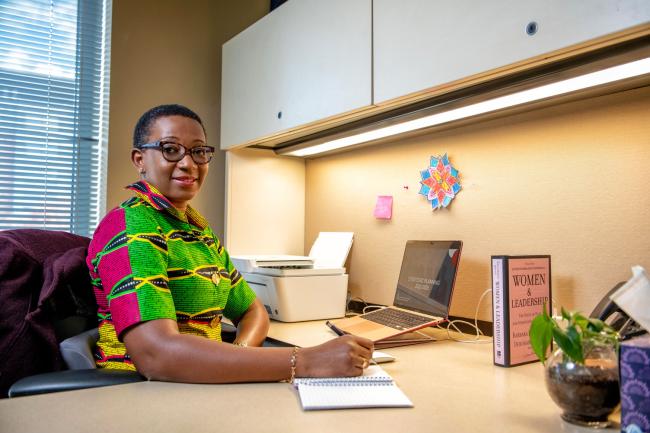By J. Jarpa Dawuni, Ph.D.
While the national unemployment rate has been steadily declining since the onset of the coronavirus, dropping to 3.8 percent in February 2022, the unemployment rate for Black women has actually been increasing, from 5.8 percent in January 2022 to 6.1 percent in February. And as the Russian invasion of Ukraine, supply chain issues and other factors contribute to rising inflation and the high cost of consumer goods, women – especially women of color – are at the very center of these crises, shouldering a disproportionate share of the burden.
It is no coincidence that those who are most victimized by a crisis also happen to be those with little power to respond to it. Women are underrepresented among policymakers, decision-makers, and money-movers, and they tend to be overlooked by the policies and decisions with financial implications that are intended to mitigate the effects of a crisis. As a result, women were once again hit hardest by this latest crisis – the COVID-19 pandemic – and it will take longer for them to recover.
Women cannot afford to endure this cycle of disproportionate devastation with every new crisis and neither can our local, national and global economies.
The unemployment rate for Black women reached a peak of 16.2 percent in May 2020 and was still around 6.9 percent as of this September 2021, compared to 4.8 percent nationally.
Black women are starting new businesses at faster rates than any other American demographic, and yet women of color still comprise only 3 percent of mature business owners and only two Black women are running Fortune 500 companies. African American women vote more consistently than any other demographic in the United States, and yet they are underrepresented in state and federal political positions.
Black women’s lack of representation in positions of leadership and authority is even more significant when you consider the critical role they play in our economy. According to the World Bank’s data on global employment, women represent 88 percent of personal care workers, 76 percent of health associate professionals and 74 percent of cleaners and helpers. Patients – at home, in the hospital, or in institutions – rely almost exclusively on Black women receptionists, technicians, nurses and personal aids to provide for their health, comfort and care. As the importance of health care and sanitation grew during the pandemic, these women provided a frontline, essential service to our communities, while putting themselves at greater risk of contracting the virus.
At the same time, women are also overrepresented in leisure, hospitality and food service, industries that had been devastated during the pandemic and are struggling to return to pre-pandemic levels of operation. As a result, Black female unemployment swelled more rapidly at the beginning of the pandemic and is descending more slowly. The unemployment rate for Black women reached a peak of 16.2 percent in May 2020 and was still around 6.9 percent as of this September 2021, compared to 4.8 percent nationally.
While it is temptingly simple to blame the pandemic or inflation for our present economic woes, the seeds of this ongoing crisis have been sown over the course of decades and generations. Across the globe, we have a preponderance of Black women working frontline jobs. At the same time, we have a paucity of Black women in the critical arenas of authority and influence.
Black women have the capacity to do anything – they just need the opportunity.
For our economies to recover, we must focus on ensuring Black women are well represented where decisions are made. We cannot allow this ongoing crisis to once again set Black women back to the point that they will never catch up. We need women of all colors in leadership positions to make decisions that will give women the boost they need to level the playing field and catapult our entire global society to new levels of productivity and prosperity.
Last year, Howard University launched the Center for Women, Gender and Global Leadership, an enterprise dedicated to expanding the rich legacy of female global leadership by advancing access and opportunity for all women, especially women of color. At the core of the center’s programming is developing an innovative global entrepreneurial leadership program for women of color. The center will produce innovative research and scholarship, provide student opportunities, grants, fellowships, and entrepreneurial leadership training and programming that will benefit women individually and collectively.
For the work of the center to truly take off, it will require widespread support for our vision and efforts. Black women have the capacity to do anything – they just need the opportunity. It is up to all in positions of authority to provide equitable opportunities for Black women. I urge leaders in business, policymakers, philanthropic organizations, corporate sponsors, alumni, and male allies to partner with center, to help us realize this vision of creating a center of excellence for Black women, feminist activism and global leadership. Together, our partners can provide financial support to students, invest in our entrepreneurial leadership programs, provide sponsorship opportunities for students and professional guidance as they navigate career paths. We also encourage other universities to join the United Nations-inspired HeforShe Campaign commitment, as Howard University has done, to advance gender equality within HBCUs to help serve their students, alumni and the larger Black community.
In the movement to introduce greater gender parity across all industries and sectors, there is a role for everyone to play. And it is to everyone’s benefit to support gender equality. Our current global interconnectivity is proof that the issue of gender equality is one that impacts all people around the world.
J. Jarpa Dawuni is associate professor of political science at Howard University and the director of the Howard University Center for Women, Gender and Global Leadership.





